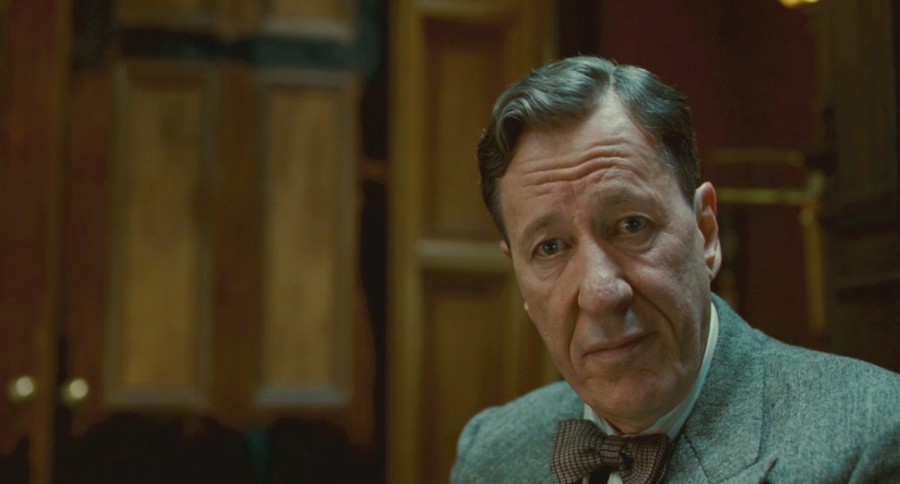Geoffrey Rush to the Rescue

GEOFFREY RUSH IN THE KING’S SPEECH. FILM STILL COURTESY OF WEINSTEIN CO
One of only 21 people who have won the acting “Triple Crown”—that’s an Emmy, Tony and Oscar—Geoffrey Rush is the rare actor who makes his job look both easy and fun. In The King’s Speech, Rush takes on the role of Lionel Logue, the little-known speech therapist who helped King George VI overcome a debilitating stutter just before he came to power prior to World War II. A lesser film about a monarchy in crisis could have been ended up as a tedious history lesson. But Rush, along with director Tom Hooper and buoyant cast members Colin Firth (as the afflicted king) and Helena Bonham Carter (as the mischievous Queen Elizabeth), maintains a sense of humor and levity in the film. We caught up with the hardworking actor before play rehearsal in Melbourne, and talked to him about finding the script on his doorstep and the trouble with being an Australian in Britain.
GILLIAN MOHNEY: Is it true you found the script on your front porch?
GEOFFREY RUSH: I live in a very leafy suburb in Melbourne, and this brown paper package was on my front doormat one day, and I thought, “Oh this is interesting.” It was lying there like an orphan… The attached letter basically said “Excuse the invasion, and for not going through the protocol of your agent, but we’re desperate for you to know that this script exists, because there is a wonderful role that we would love for you to consider.” So I read it.
MOHNEY: Why did it appeal to you?
RUSH: I knew at first about the whole historical aspect of the story: the abdication, The Duke of York having a stammer, and all the speeches he made through the second World War. But I had no idea about the Lionel Logue aspect. The fact that it was an Australian character in this international scenario was very intriguing from a patriotic level, as well as, the [drama] of How do these guys meet? and How they get on? [There’s a] cultural gulf between them: the class difference, the geographical difference, the nature of their family backgrounds. One was coming from a millennium-old dynastic history, and the other was the son of a brewer and was interested in Shakespeare.
MOHNEY: You had such a good partner in Colin Firth. I know you two worked together briefly in Shakespeare in Love—did that history help you in this film?
RUSH: In Shakespeare in Love, we only shot together for a [few] days back in 1998. I don’t think my character directly interacted with him. Later in the year, we were at the press junket in New York, where Colin, Rupert Everett, and I hung out together for about four days. I don’t think I’ve ever laughed so hard in my life; they’re both ridiculously hilarious people. When I met Colin again, we just gravitated toward each other… In the onscreen comedy stuff that he does, Colin has this brilliant deadpan “Doofus” quality, but in real life he is extremely quick-witted.
MOHNEY: All the scenes of the different therapy sessions are very funny, but very moving. It doesn’t make fun of his speech stammer at all, but it still allows a sense of the ridiculousness.
RUSH: We talked about all the great onscreen stammering performances, like Michael Palin in A Fish Called Wanda. That was an amazing piece of work, even though it was in the context of a farce. The truthfulness of that stammer was painfully funny, because he had key information he just couldn’t get out, and it was driving John Cleese up the wall… From the diaries that we got to read, we realized both Lionel and the Duke of York had whimsical and twinkling senses of humor that you don’t often see in the news-reel footage. The diaries did tell us when Logue says, “You’re still stammering on the W,” and [King George VI] says “Well I had to throw a few in, so they knew it was me.” No screenwriter could ever come up with that idea, that was absolutely originally minted by George VI himself.
MOHNEY: Being Australian, and [the director] Tom Hooper being half-Australian, did that effect the way your approach to this character at all?
RUSH: I went to England in the ’70s, and I was in my early 20s. There was still a residue of that era of [Australians] being an underclass or colonial. I assume it must have been a more aggressive and prominent attitude 40 years before that, because Australia internationally wasn’t regarded as having much cultural value. We were a country full of sheep and convicts… We really wanted to find where there was that sort of inadvertent racism. In the first scene, when Princess Elizabeth comes to Logue’s room, it’s highly unlikely that at the point she would have ever been in such a weird place: “Who is this guy? He doesn’t have a receptionist. He was just washing his hands in the bathroom and is now shaking my hand and he’s moving too close to my royal person.”
THE KING’S SPEECH (WEINSTEIN CO.) WILL BE RELEASED NOVEMBER 26.






